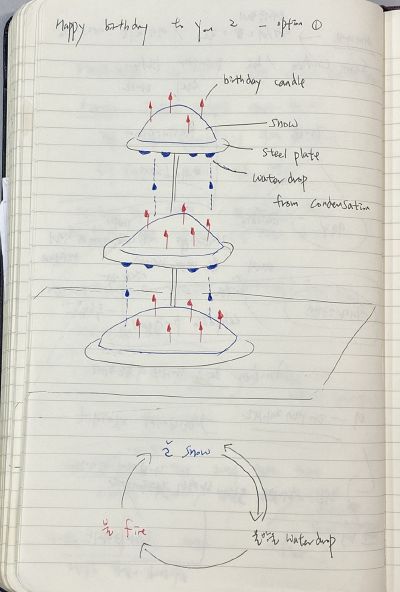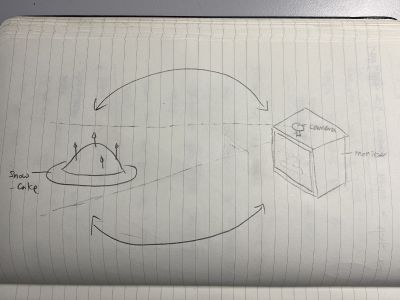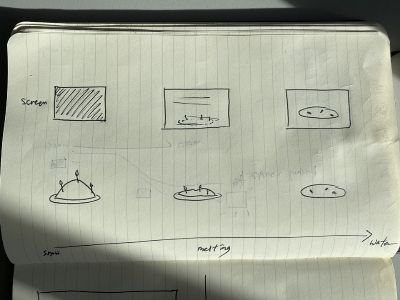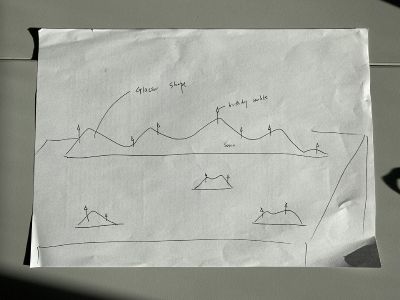No edit summary |
No edit summary |
||
| (One intermediate revision by the same user not shown) | |||
| Line 4: | Line 4: | ||
‘Happy Birthday to You’ is an artistic research project inspired by the similarities between how nature change over time and how analog electronic signals work. A digital signal consists of only 0 and 1. Analog signals, on the other hand, operate on a continuum of numbers between 0 and 1. Whereas a digital signal is a binary outcome, an analog signal is a process of constant change. | |||
The nature that surrounds us changes just like an analog signal. The sun doesn't rise and set like a switch (on-off/ 1-0). The sun is constantly rotating, and its light gradually gets brighter and dimmer. The same goes for the way a day goes, the seasons change, and even the way all beings are born and die include human. Life is a continuous process of change. It doesn't change digitally, it changes analogically. | |||
'Happy Birthday to You’ represents poetically the constant physical change of nature actor as analog signals in real time. It proposes a new dialogue about the circularity and continuity of time and the relationship between nature and technology in the context of the current environmental crisis. | |||
==Technical solution== | ==Technical solution== | ||
Latest revision as of 10:59, 20 April 2023
Happy birthday to you
‘Happy Birthday to You’ is an artistic research project inspired by the similarities between how nature change over time and how analog electronic signals work. A digital signal consists of only 0 and 1. Analog signals, on the other hand, operate on a continuum of numbers between 0 and 1. Whereas a digital signal is a binary outcome, an analog signal is a process of constant change. The nature that surrounds us changes just like an analog signal. The sun doesn't rise and set like a switch (on-off/ 1-0). The sun is constantly rotating, and its light gradually gets brighter and dimmer. The same goes for the way a day goes, the seasons change, and even the way all beings are born and die include human. Life is a continuous process of change. It doesn't change digitally, it changes analogically. 'Happy Birthday to You’ represents poetically the constant physical change of nature actor as analog signals in real time. It proposes a new dialogue about the circularity and continuity of time and the relationship between nature and technology in the context of the current environmental crisis.
Technical solution
- 1. put birthday candles in snow (snow cake)
- 2. Install the camera facing the snow cake and monitor
- 3. connect the camera to the monitor.
- 4. cut the video cable connecting the camera and monitor.
- 5. put the two cutted cables into the snow cake
- 6. Snow has little conductivity, and water has a high conductivity. As the snow melts into water, the amount of active electrons between the cutted cables increases.
- 7. The snow cake appears on the monitor affected by the process of melting the snow cake itself.
Experiments
1. Sound installation
Interactive process
- 1. Fire melts Snow
- 2. Snow makes Water drop (through condensation)
- 3-1. Water drop put out the Fire
- 3-2. Water drop melts Snow
Sound
- Sound 1 : The moment the fire meets the snow
- Sound 2 : The moment the water drops falling on snow and fire
Technical position
- A microphone is used to amplify the sound.
- piezo mic experiments
- condenser mic test
2. Video Installation
The process of interaction between snow and fire interacts again with electricity.
Technical position
- video - analogue _ camcorder - tv
- USB - Webcam
- snow - electricity
- peltier expriment
- water sensor test
3. Sculpture
Class expriments
References
- Nam June Paik’s TV Buddhas, https://medium.com/@codenamecatstac/nam-june-paiks-tv-buddhas-e3606957b23f



